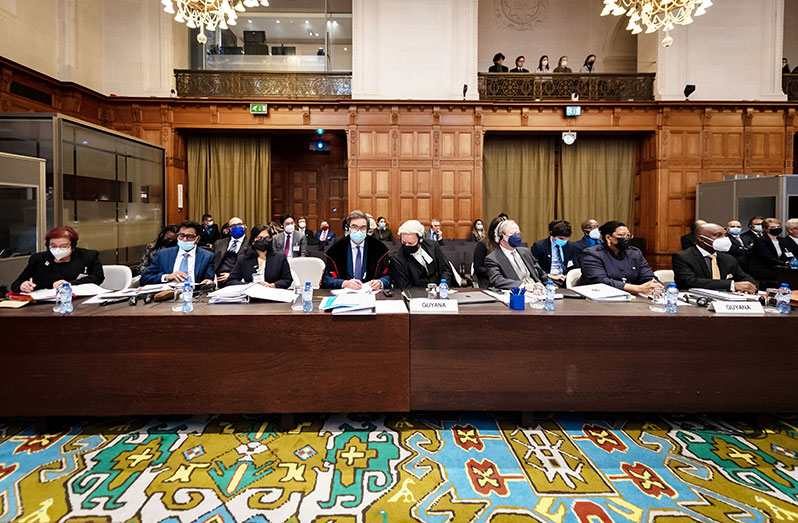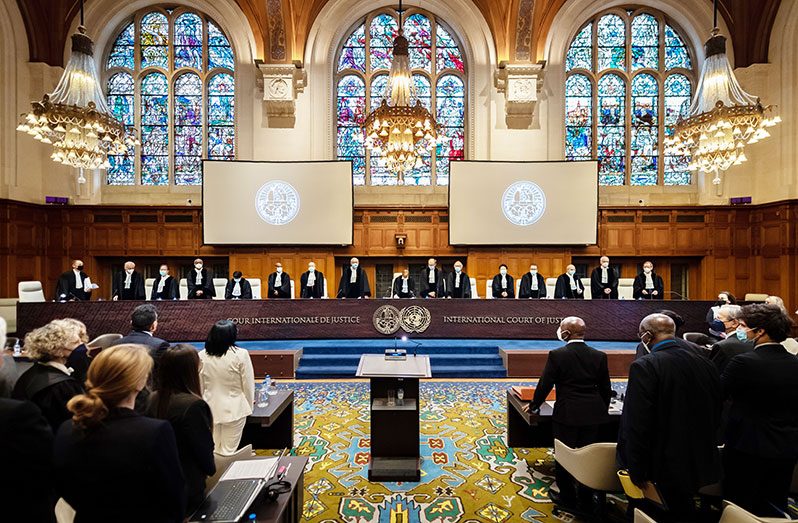TODAY, Guyana will present arguments to the International Court of Justice (ICJ),the highest court in the world, on the preliminary objections that were raised by Venezuela in the border controversy case.
On Thursday, Executive Vice-President of Venezuela, Delcy Rodríguez opened the first round of oral arguments at the Peace Palace in The Hague, Netherlands, and called upon the ICJ judges to dismiss the case filed by Guyana.
Claiming that it has territorial rights over the Essequibo region, Venezuela raised the Monetary Gold Principle, and contended that the ICJ is not competent to settle disputes between the two countries, unless her country agrees to exercise jurisdiction regarding the Arbitral Award of October 3, 1899 (Guyana v. Venezuela).
Guyana will present its first round of oral arguments today, Friday. The country, in its legal documents, has asked the Court to confirm that the border was established by the 1899 Arbitration Process involving Venezuela and the then-colony of British Guiana.
Guyana will be represented at the hearings by Attorney-General and Minister of Legal Affairs Anil Nandlall, S.C.; Minister of Parliamentary Affairs and Governance, Gail Teixeira; Agent of Guyana, Carl Greenidge; Co-Agent and Permanent Secretary in the Ministry of Foreign Affairs and International Co-operation, Ambassador Elisabeth Harper; Director of the Frontiers Department of the Ministry of Foreign Affairs and International Co-operation, Donnette Streete; and Adviser to the Leader of the Opposition on Frontier Matters, Ambassador Ronald Austin.
Guyana’s legal team is being headed by Co-Agent and Counsel, Sir Shridath Ramphal, and includes member of the Bars of the United States Supreme Court and the District of Columbia, Paul S. Reichler; Professor Emeritus of the University Paris Nanterre, former Chairman of the International Law Commission and member of the Institut de Droit International, Alain Pellet; Professor of International Law at University College, London, Philippe Sands; Professor of International Law and Senior Fellow at Massey College, University of Toronto, and member of the Bar of New York, the Law Society of Ontario and the Permanent Court of Arbitration, Payam Akhavan; Professor Ordinaire, Université Catholique de Louvain and member of the Institut de Droit International, Foley Hoag, LLP and the Bar of Brussels, Pierre d’Argent; member of the Bars of the District of Columbia, the State of New York, England and Wales, and the Law Society of Ontario, Christina L. Beharry; Barrister from Matrix Chambers, London, Edward Craven; member of the Bar of the State of New York, Juan Pablo Hugues Arthur; and member of the Bar of the District of Columbia, Isabella F. Uria.

Guyana had moved to the ICJ with its case in March 2018, challenging the non-participating Bolivarian Republic of Venezuela over its disagreement on the legal validity and binding effect of the 1899 Award.
Venezuela had maintained that the ICJ was without jurisdiction to hear the case, and had refused to participate in the court proceedings.
In a December 18, 2020, 12-4 majority ruling, the ICJ upheld that it has jurisdiction to entertain Guyana’s contention concerning the validity of the 1899 Award about the frontier between British Guiana and Venezuela, and the related question of the definitive settlement of the land boundary.
The ICJ pointed out, too, that both Guyana and Venezuela had agreed to the 1966 Geneva Agreement, which showed that both parties had accepted the possibility of the controversy being resolved by means of judicial settlement.
After a case management meeting, the ICJ had set time limits for Guyana and Venezuela to file written pleadings on the merits of the case.
Guyana met its March 8, 2022 deadline to submit its Memorial on the merits of its case to the Court. Venezuela, on the other hand, submitted preliminary objections.
As a result, the ICJ allowed for such an objection to be lodged and considered by the Court, and, as a consequence, the proceedings on the merits of the case were suspended until it rules on the preliminary objections.
Guyana maintains that a judicial settlement of the matter is the only recourse remaining, as it has exhausted all other measures.
As recently as October 4, the United States government reaffirmed the validity of the 1899 Arbitral Award, and solidified its support for a “peaceful resolution” of the Guyana-Venezuela border controversy through the proper court, if there is any deviation from that Award.
Guyana seeks to obtain a final and binding judgement that the 1899 Arbitral Award, which established the location of the land boundary between the two countries, remains valid, and that the Essequibo region belongs to Guyana, and not Venezuela.



.jpg)











